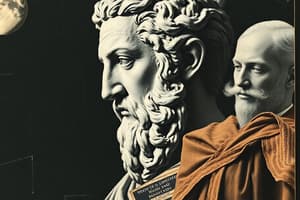Podcast
Questions and Answers
According to existentialism, how is the self defined?
According to existentialism, how is the self defined?
- By external factors like gods or authorities
- By personal choices and actions (correct)
- By societal norms
- Through predetermined purpose
What is a key aspect of Eastern philosophies like Buddhism and Hinduism regarding the self?
What is a key aspect of Eastern philosophies like Buddhism and Hinduism regarding the self?
- Belief in fixed identity
- Encouragement to transcend worldly attachments (correct)
- Emphasis on a permanent self
- Promotion of individuality and creativity
In John Locke's empiricism, what are the two kinds of experiences mentioned?
In John Locke's empiricism, what are the two kinds of experiences mentioned?
- Thinking and Believing
- Sensation and Reflection (correct)
- Perception and Imagination
- Sensation and Intuition
What does Locke consider as primary qualities of objects?
What does Locke consider as primary qualities of objects?
What does existentialism emphasize in terms of responsibility?
What does existentialism emphasize in terms of responsibility?
According to Plato's Theory of Forms, how does the physical world relate to the ideal Forms?
According to Plato's Theory of Forms, how does the physical world relate to the ideal Forms?
In Descartes' Dualism, what does 'RES COGITANS' refer to?
In Descartes' Dualism, what does 'RES COGITANS' refer to?
What distinguishes the mind from the body in Descartes' Dualism?
What distinguishes the mind from the body in Descartes' Dualism?
According to Plato, what do our physical selves represent?
According to Plato, what do our physical selves represent?
How does Descartes describe the body in relation to the physical world?
How does Descartes describe the body in relation to the physical world?
According to existentialism, how is the self viewed in terms of essence?
According to existentialism, how is the self viewed in terms of essence?
In Locke's empiricism, what distinguishes primary qualities of objects from secondary qualities?
In Locke's empiricism, what distinguishes primary qualities of objects from secondary qualities?
How do Eastern philosophies like Buddhism and Hinduism differ in their views on the concept of self?
How do Eastern philosophies like Buddhism and Hinduism differ in their views on the concept of self?
What distinguishes John Locke's concept of reflection from sensation in his empiricism?
What distinguishes John Locke's concept of reflection from sensation in his empiricism?
What aspect of existentialist notions of self causes individuals to experience the anxiety of freedom?
What aspect of existentialist notions of self causes individuals to experience the anxiety of freedom?
What is the central idea behind Plato's Theory of Forms in relation to the self?
What is the central idea behind Plato's Theory of Forms in relation to the self?
How does Descartes define the mind in his concept of Mind-Body Dualism?
How does Descartes define the mind in his concept of Mind-Body Dualism?
In Descartes' Dualism, what role does the body play according to 'RES EXTENSA'?
In Descartes' Dualism, what role does the body play according to 'RES EXTENSA'?
How does Plato view the self in comparison to the material world?
How does Plato view the self in comparison to the material world?
What distinguishes Plato's view of the self from Descartes' Dualism?
What distinguishes Plato's view of the self from Descartes' Dualism?
Flashcards are hidden until you start studying




